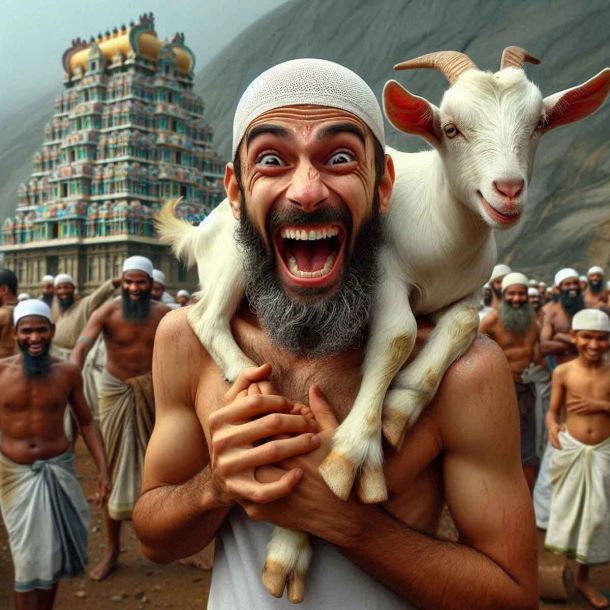MORE COVERAGE
Twitter Coverage
Satyaagrah
Written on
Satyaagrah
Written on
Satyaagrah
Written on
Satyaagrah
Written on
Satyaagrah
Written on
JOIN SATYAAGRAH SOCIAL MEDIA
The real truth about halal which no one wants you to know: Unmasking the Reality of Halal Business Network

Halal economy is the new term to describe the convergence of Halal industry and Islamic finance which comes from one source- Islam. Muslim consumerism is valued at an astounding 2.1 trillion USD and the numbers are expected to grow. By the year 2050 global population of Muslims will increase from a current 1.8 billion to 2.8 billion. Halal has been accepted global as a product of hygiene, quality, pure, safety and clean.
“Evil is unspectacular and always human
And shares our bed and eats at our own table”
W.H. AUDEN, Herman Melville
To begin by using a quote that implies attribution of evilness to the concept of “Halal” sounds clearly biased on my part. But what good I can really make out of it when the very fundamentals on which this entire business module runs are loaded with the idea of religious supremacy and exclusion, which out rightly debars people of other faiths to become a part of this business network, unless they convert or accept to live as a second class citizens. So, it is not exactly me who is biased, rather it is the operational module of halal network that forces me to take that position in the first place. And I am in no mood to play this down with some clever hit job by making outlandish claims against the operation module of Halal network. In this entire piece of article, I will break down point by point nuances of halal network that will compel any reasonable mind to question the intent of promoters of Halal module, who nowadays are busy in crying all wolves in the name of religious intolerance and victimization of Muslims all across the globe.
 |
Concept of “Halal” is problematic by its very definition
Etymologically the word “halal” means permissible. Now that itself leaves us with three basic questions. First, permissible to whom? Second, permissible by what standards? Third, who has the authority to judge that permissibility?
The moment we try to figure out those questions the true nature of Halal module falls out of the mask of sugar-coated abbreviations which promoters of it are trying to carry forward for the last many years. Fortunately, the definition of “halal” answers the first two questions upfront, which reads as, things and practices that are permissible under Islam for Muslims1. So, in other words Islamic standard for a thing or practice to qualify it for the use of Muslims is what actually defines the term Halal.
Now coming to the third question i.e., which authority is going to judge this permissibility? Well keeping in context the definition of Halal, it is quite evident that it is none other than Islamic religious bodies who reserve the exclusive right to fix those parameters of the permissibility for a product or service to qualify that status and this is for the simple reason that if any other person dares to do that his/her competence will effectively come under question by Islamic scholars and religious bodies who have already put plenty of literature in public domain to justify the concept of halal in the light of Quran and Hadith.
Moreover, even if we set aside religious side of halal module for a moment and try to substantiate the very same point by putting it in contrast with the ground reality then again we will come down to the same conclusion because there is no non-Muslim player in this game of Halal certification, wide across the globe, that hold stakes in fixing the permissibility standards for judging a thing or service to be Halal or non Halal, which is quite obvious also to some extent. So, both subjectively and objectively the concept of Halal carries the notion of religious exclusivism in its very foundations.
Halal module is exploitative and opportunistic in nature
It is usually a misconception that the concept of Halal is only confined to food items. But the reality is that the operational domain of Halal network nowadays includes a whole range of subjects2 like banking, medical services, cosmetics, housing, tourism, prostitution, music, etc.
Now on the face of it that doesn’t sound much problematic because from an economic point of view, who on earth doesn’t want to expand its business network especially when it guarantees you to operate like a monopolistic market without even following required statutory obligations in the garb of religious freedom. So, when I say, Halal business module is exploitative and opportunistic in nature, what do I mean exactly? Well to understand that standpoint we must primarily focus on two aspects. First, the manner in which it is operating and Secondly, the consequences it will generate on a mixed market economy like India.
 |
Manner
- Actual operational outreach of Halal module breeds in ambiguity and leaves too much grey area to inject religious supremacy
Another common misconception about Halal module is that it operates in black and white and there is no grey area whatsoever between these two Islamic categorizations of Halal and non Halal. But the truth of the matter is that a grey area exists in the name of “Mushbooh”3, which refers to those things and practices which are not clear in terms of being “Halal” or “Haram”. And even from a practical point of view the concept of “Mushbooh” has a genuine role to play in the scene because sometimes it is really difficult to identify a product or service being Halal or non-Halal simply due to unavailability of information regarding the content and source of such product or service.
But that’s not the bigger concern here, apart from reiterating the fact that a grey area exists, the larger question that needs to be addressed here is, in whose favour that grey area is positioned. So if we go by the understanding of Islamic scholars and religious bodies, Muslims are not even permitted to use products or services that falls in the category of Mushbooh, which clearly suggests that the operational domain of such restriction stretches far beyond what is halal or non halal because the moment we start calculating the impact on goods and services that comes under this category of Mushbooh, we came to realise that it ridiculously covers each and everything on planet earth unless exempted by Islamic religious bodies for being not so.
So, wide discretionary power falls in the hands of Islamic religious bodies on that count. And this ambiguity is clearly positioned in a way that it is always going to serve the economic and religious interest of Muslims by casting a sort of fear psyche in the minds of producers of goods and services that if they do not comply with the requirement of Halal module which is monopolised by Islamic religious bodies then on any next day their products or services will be labelled as Mushbooh, regardless of the fact that whether they are actually manufacturing that product with such intentions or not. So, in other words this category of “Mushbooh” is acting as a catalyst which is carefully positioned to push business entities and individuals to the goalpost of having Halal certification to escape the operational clutch of this grey area. This sort of ambiguity and unbridled discretion that follows the whims and fancies of Islamic religious bodies is vulnerable enough to promote institutionalised discrimination against people based on religion.
- Halal module is promoting religious supremacy and exclusion
The antithesis of “Halal” is “Haram” which is a derogatory connotation given to things or services that have non Islamic origins or in other words that does not fall in line with the Islamic idea of purity. The only term that can match the gravity of this sort of negative connotation is the word “Kafir”, which is again a derogatory term used in Islam to denigrate and insult non believers to a status of second class of citizens, especially when it comes to their rights and privileges at par with Muslim (believers). Moreover, under Islamic belief system this deviation from the path of Allah is considered as a sin and enjoins holy duty upon Muslims to bring them on the right path4. And that’s where precisely the problem begins because now this Halal module no longer remains a plain simple business module rather it is loaded with the burden of religious commandment which majority Muslims found compelling to obliged with. So, from that perspective the concept “halal” is severely problematic because in the long run it will devastate the very dynamics of the economy and make it subservient to religious obligations and commandments which is wholly unwarranted and dangerous in pluralistic nations like India.
- Modus operandi of Halal module is self-contradictory and opportunistic
The current operational domain of Halal module is full of self-contradictions and opportunistic undertones. Even Hadith and Quranic references are exploited by Islamic religious bodies for their economic benefits. And to substantiate that point let me give two examples on this count.
- Halal Cosmetics5
The first glaring example comes from the cosmetics and makeup industry. Among Islamic religious bodies use of cosmetics and makeup by Muslims is one of the most debated spheres. Since the very beginning Islamic scholars used to debate over this subject by putting several interpretations of the Quran and Hadith. Now if we directly go by those Quranic and Hadith references, keeping aside the interpretations of Islamic religious bodies, the central idea that comes out of it is that Muslims (women in particular) are not allowed to use cosmetics and makeup in general for two basic reasons; First, use of cosmetics will amount to the alteration of Allah’s creation. Second, use of cosmetics will provoke the sexual desires of (non mahram) males, if Muslim women fall prone to their gazes. This position is very much evident in the teachings of Quran and Hadith, which reads as follows:
 |
Displaying your beauty and ornaments is forbidden6
Quran 24:31
And say to the believing women that they should lower their gaze and guard their modesty; that they should not display their beauty and ornaments except what (must ordinarily) appear thereof; that they should draw their veils over their bosoms and not display their beauty except to their husbands, their fathers, their husband’s fathers, their sons, their husbands’ sons, their brothers or their brothers’ sons, or their sisters’ sons, or their women, or the slaves whom their right hands possess, or male servants free of physical needs, or small children who have no sense of the shame of sex; and that they should not strike their feet in order to draw attention to their hidden ornaments. And O ye Believers! turn ye all together towards Allah, that ye may attain Bliss.
Only those belonging to Satan alter the creation of Allah7
Quran 4:117-121
(The Pagans), leaving Him, call upon female deities: They call but upon Satan the persistent rebel! Allah did curse him, but he said: “I will take of Thy servants a portion Marked off; “I will mislead them, and I will create in them false desires; I will order them to slit the ears of cattle, and to deface the (fair) nature created by Allah.” Whoever, forsaking Allah, takes Satan for a friend, hath of a surety suffered a loss that is manifest. Satan makes them promises and creates in them false desires; but Satan’s promises are nothing but deception. They (his dupes) will have their dwelling in Hell, and from it they will find no way of escape.
Getting or giving a tattoo is forbidden
Sahih Bukhari 7:72:830
Narrated Abu Huraira : A woman who used to practise tattooing was brought to ‘Umar. ‘Umar got up and said, “I beseech you by Allah, which of you heard the Prophet saying something about tattooing?” l got up and said, “O chief of the Believers! l heard something.” He said, “What did you hear?” I said, “I heard the Prophet (addressing the ladies), saying, ‘Do not practice tattooing and do not get yourselves tattooed.'”
Getting your teeth straightened is forbidden8
Sunan Ibn Majah 3:9:1989
It was narrated that ‘Abdulleh said: “The Messenger of Allah cursed the woman who does tattoos and the one who has them done, and those who pluck their eyebrows and file their teeth for the purpose of beautification, and those who change the creation of Allah.” News of that reached a woman of Banu Asad who was called Umm Ya’qub. She came to him and said: “I have heard that you said such and such.” He said: ‘Why should I not curse those whom the Messenger of Allah cursed? And it is in the Book of Allah.” She said: “I read what is between its two covers ‘and I have not found that.” He said: “If you read it properly you would have found it. Have you not read the words: ‘And whatsoever the Messenger (Muhammad) gives you, take it; and whatsoever he forbids you, abstain (from it).’?” She said: “Of course.” He said: ‘The Messenger of Allah forbade that.” She said: ‘I think that your wife does it.’ He said: ” Go and look.” So, she went and looked, and she did not see what she wanted. She said: “I have not seen anything!’ ‘Abdullah said: “If she was as you say, I would not have kept her with me. ” (Sahih)
Getting your hair cut is forbidden9
Al-Mu’jam al-Sagheer, Baabul Haa, Man Ishuhu Al-Hasan, vol. 1, p. 229, Dar Al-Ammar
Rasulullah (sallallaahu alayhi wa sallam) prohibited women from allowing their hair to drop on their shoulders (by cutting it)
Getting or providing hair extensions is forbidden
Sahih Bukhari 7:72:818
Narrated Asma: (the daughter of Abu’ Bakr) A woman came to Allah’s Apostle and said, “I married my daughter to someone, but she became sick and all her hair fell out, and (because of that) her husband does not like her. May I let her use false hair?” On that the Prophet cursed such a lady as artificially lengthening (her or someone else’s) hair or got her hair lengthened artificially.
Removing excess facial hair is forbidden
Sahih Bukhari 7:72:832
Narrated ‘Abdullah : Allah has cursed those women who practice tattooing and those who get it done for themselves, and those who remove hair from their faces, and those who artificially create spaces between their teeth to look beautiful, such women alter the features created by Allah. Why should I not then curse those whom Allah’s Apostle has cursed and that is in Allah’s Book?
Getting your eyebrows plucked is forbidden10
Sunan Ibn Majah 3:9:1989
It was narrated that ‘Abdulleh said: “The Messenger of Allah cursed the woman who does tattoos and the one who has them done, and those who pluck their eyebrows and file their teeth for the purpose of beautification, and those who change the creation of Allah.” News of that reached a woman of Banu Asad who was called Umm Ya’qub. She came to him and said: “I have heard that you said such and such.” He said: ‘Why should I not curse those whom the Messenger of Allah cursed? And it is in the Book of Allah.” She said: “I read what is between its two covers ‘and I have not found that.” He said: “If you read it properly you would have found it. Have you not read the words: ‘And whatsoever the Messenger (Muhammad) gives you, take it; and whatsoever he forbids you, abstain (from it).’?” She said: “Of course.” He said: ‘The Messenger of Allah forbade that.” She said: ‘I think that your wife does it.’ He said: ” Go and look.” So, she went and looked, and she did not see what she wanted. She said: “I have not seen anything!’ ‘Abdullah said: “If she was as you say, I would not have kept her with me. ” (Sahih)
So logically speaking, by and large there is not much freedom for Muslim women to enjoy in that sphere. Now since these references of Quran and Hadith are vulnerable to the authoritative interpretations of Islamic religious bodies, therefore the possibility of getting it misused cannot be overruled. And the glimpse of it is quite evident from the fact that nowadays Islamic religious bodies (especially those who are involved in halal certifications) are busy in blurring the lines of restrictions with the intent to exploit the economic worth of the cosmetic industry for their own benefits. And this clever shift in the goal post could be understood by simply going to the catalog of cosmetic products which are lined up for the Halal certification. Therefore, the current prevailing circumstances clearly suggests that this entire Halal module is full of opportunistic and exploitative undertones based on the whims and fancies of Islamic religious bodies.
 |
- Halal prostitution11
Let me be clear at the very ouset that I have no personal issues with prostitution as long as it goes on legally in a given society. But when it comes to Islamic jurisprudence the set of rules are crystal clear, the act of prostitution falls in the category of “Zina” which means unlawful sexual intercourse. Muslim scholars have historically considered zinā, a sin or a crime against god. It is mentioned in both Quran and Hadiths, which reads as follows:
The Qur’an deals with zinā in several places. First is the Qur’anic general rule that commands Muslims not to commit zinā:
Nor come nigh to fornication/adultery: for it is a shameful (deed) and an evil, opening the road (to other evils)”
Qur’an, Surah Al-Isra [17:32]12
In Hadiths, the books trusted in Islam after Quran, the definitions of Zina have been described as all the forms of sexual intercourse, penetrative or non-penetrative, outside lawful marriage.
Sahih Muslim, Vol. 6, Book of Destiny, Hadith 642113
Abu Huraira reported Allah’s Apostle as saying: Verily Allah has fixed the very portion of adultery which a man will indulge in, and which he of necessity must commit. The adultery of the eye is the lustful look, and the adultery of the tongue is the licentious speech, the heart desires and yearns, which the parts may or may not put into effect.
So, coming straight to the point the idea which above mentioned references of the Quran and Hadith straight forwardly convey that practices like Prostitution and adultery have no place in Islam. But again, the economic worth of global sex market watered the mouths of Islamic mullahs and now they have devised a module for the Halal certification of prostitution as well, which is outrightly opportunistic and exploitative by all possible standards available in Islamic jurisprudence. Although it is important to mention here that this approach is not yet standardised and confirmed by majority Islamic religious entities but nevertheless even the beginning of it explains much about the true nature and intent behind Halal certification business module.
Consequences
- Halal network generates an inescapable trap of a monopolistic market module loaded with the idea of religious supremacy
In the long run the Halal business model will generate an inescapable trap of a monopolised market structure where decision making authority remains subservient to Islamic religious commandments. In other words, Halal network is pushing forward a sophisticated form of monopolistic market module which escapes all statutory obligations that normally apply to any such market module in the garb of religious freedom. And if such a market module can operate freely in countries like India then it will bound to breed institutionalised discrimination on the basis of religion in economic activities.
- Halal module is prone to promote Islamic fundamentalism14
Halal business network is basically meant to serve the interests of Muslims all across the globe. In particular the interests of gulf nations who are the biggest financers and promoters of this business module. And the gravity of this religiously exclusivist module could be understood by the fact that in 2017, the global halal economy amounted to $2.1 trillion as the world’s roughly 1.8 billion Muslims warm up to halal lifestyle products. According to the State of the Global Islamic Economy Report 2018/19 by Thomson Reuters and Dinar Standard. Halal food and beverage products make up the largest category, with consumers worldwide spending $1.3 trillion, followed by halal clothing at $270 billion, halal media and entertainment at $209 billion, halal travel at $177 billion, halal pharmaceuticals at $87 billion, and halal cosmetics $61 billion. And as per the future forecasts the report projects the global halal economy to hit $3 trillion in 2023.
So, even if for a moment we set aside our concerns regarding the religiously exclusivist nature of this Halal business module, there is one more challenge that demands attention which is the frequent use of gulf finances in promoting Islamic fundamentalism. Many entities and individuals have flared warning regarding use of halal networks in financing terror activities. It is a bitter reality that the world has not yet recovered from the after-effects of petrodollars which is widely regarded as the backbone of promoting Islamic fundamentalism. So, considering the growing economic influence of Halal network it would not be an exaggeration to say that this will further provide an arsenal to gulf nations which are known for promoting Islamic fundamentalist ideologies like Salafism and Wahabism.
- Halal module will end up killing diversity in mixed market economies like India
The textbook case to understand this scenario is the way Halal certified food sector is operating. Manufacturing, processing and serving of Halal food is out and out a religiously exclusivist practice which debars people of other faiths to become a part of this process. Preparing of Halal food requires that animals must be slaughtered in the name of Allah and the person who is doing it must be well versed in Islamic way of slaughtering animals. So, the entire model of this Halal food chain engages only people of a particular religion to thrive upon this economic model while others will always remain on the receiving end.
- Halal module heading towards the revival of Jaziyah tax on non muslims15
If there is any way possible to again impose Jaziyah tax on non-muslims then this Halal business module is the best available option in the basket for Islamists to go with. The operational outreach and functioning of Halal business module are cleverly designed to impose a sophisticated version of Jaziyah tax on non-Muslims. And the basic alteration which it has gone through in terms of befooling others is that it shifted its focus from imposing liability on non-muslims to incentivising Muslim owned business entities from the revenue generated out of Halal certifications while keeping the stakes high for non muslims for carrying that same sort of business. This incentivisation, which is based on purely religious considerations, will end up choking non-muslim business entities, who refused to comply with Islamic standards of halal certification, by generating huge gap in profit margins and supply chain for non-muslims. The textbook reference on this count is the way in which the meat market is operating today in India. Jhatka activist, Ravi Ranjan Singh has clearly pointed this threat while he was speaking on the topic of “Halalonomics And The Fight For Jhatka Meat” on Srijan Talks16.
 |
Halal module is violative of Constitutional rights of Indian citizens, especially those who are non-muslims
Another most important point is that the Halal business module poses a clear threat to the Constitutionally guaranteed rights and freedoms of Indian citizens.
- Breeds institutionalised discrimination based on religion
The most common example on this count comes from Halal certified food, now as mentioned earlier manufacturing of Halal food (meat) requires prior knowledge of Islamic way of slaughtering animals and such slaughtering must be made in the name of Allah, which therefore requires to be performed by the person of a particular faith (Muslim). So, in that sense it clearly restricts people of other faith to have stakes in the manufacturing process, which therefore directly stands in violation of fundamental rights like right to equality, right to equal opportunity and right against religious discrimination as guaranteed by the Constitution of India.
- Absence of informed consent – Violative of Article 19 of Indian Constitution
Not only the manufacturing of Halal food is problematic but the manner in which Halal food is served to the consumers (especially non-muslims) in India stands in clear violation of Article 19. The said Article demands that before a person is subjected to do anything there must be an informed consent from his side. But the information which we have gathered through the RTI initiatives17 of Sarayu Trust, clearly suggests that before serving Halal food to the consumers, food joints/canteens owned by government and non-government authorities do not bother to mention that the food which they are serving is Halal or non-halal. Majority of people in India are subjected to eating Halal food without even getting informed about the true nature of food items, neither in the food menu nor otherwise. So, the aspect of informed consent is completely lacking on that count which therefore attracts clear violation of Article 19 of the Indian Constitution.
Issue of Animal cruelty18
Another problematic part of Halal module is that in the food (meat) manufacturing sector it promotes animal cruelty by inflicting unnecessary pain on animals. Islamic way of slaughtering animals requires that the animal must bleed to death by leaving its spinal cord intact with the body during the process of slaughtering so that the maximum amount of blood must drain out its body. Pro-animal laws and organizations who work for animal rights in India are largely ignorant on this subject or else they hesitate to question it due to the fear of being bullied and branded with certain tags. European laws on the other hand are very clear on this subject, they require animals to be stunned before they are slaughtered. The exemptions which were earlier granted on religious basis are now being heavily criticised and as a result of it several European countries have taken down those exemptions.
In 2014 the Danish government joined Switzerland, Sweden, Norway and Iceland in voting to remove this exemption and ban religious slaughter on the grounds that “animal rights come before religion”. Moreover, animal rights organizations like PETA remarked that halal slaughter is “a prolonged torment”, saying that the animals have to “fight and gasp for their last breath, struggling to stand while the blood drains from their necks”. The British Veterinary Association calls for all animals to be effectively stunned before slaughter, while the Farm Animal Welfare Council says cutting an animal’s throat is “such a massive injury [that it] would result in very significant pain and distress in the period before insensibility supervenes”. So, the current scenario in European countries is rapidly changing in terms of granting exemptions to slaughter animals on religious basis.
 |
Constant and careful vigilance is the need of the hour
All those points which I have put forth in this article are compelling enough to question the intentions of the promotors and sponsors of Halal business module, especially in non-muslim majority countries. And it would be a horrible mistake on our parts if we try to downplay its design by misunderstanding (or say underestimation) with some plain simple business model. Right from its very definition to the consequences it is generating on ground are driven and dominated with the idea of religious supremacy and exclusion and there are still many areas on this subject that are hidden from our notice and have gathered enough leverage to breed in ambiguity and confusion.
Especially the background of those who are trying to mainstream this business module in the formal economy of countries like India. So, with all sincerity this subject matter requires more detailed investigation and thorough examinations based on data and impact assessment studies to outline the actual depth and potential of Halal business network. Moreover, another troubling side of this module is that once it catches the grip over formal economy it is almost impossible to undo its consequences. So the risk factor that it carries in terms of hijacking formal economies and transforming it into an economic model that is subservient to the cause of one particular religion is utmost alarming and may be that’s the reason why many experts are nowadays prefer to call it a parallel economy in itself.
References:
- sarayutrust.org
- halalindia.co.in
- en.wikipedia.org
- politicalislam.com and al-islam.org
- womensweekly.com.sg and halalindia.co.in
- wikiislam.net
- ibid
- ibid
- ibid
- ibid
- albawaba.com and bbc.co.uk
- quran.com and en.wikipedia.org
- muflihun.com
- sarayutrust.org
- youtu.be
- ibid
- sarayutrust.org
- sarayutrust.org
- indiafacts.org.in - Avinash Vasishth
 Support Us
Support Us
Satyagraha was born from the heart of our land, with an undying aim to unveil the true essence of Bharat. It seeks to illuminate the hidden tales of our valiant freedom fighters and the rich chronicles that haven't yet sung their complete melody in the mainstream.
While platforms like NDTV and 'The Wire' effortlessly garner funds under the banner of safeguarding democracy, we at Satyagraha walk a different path. Our strength and resonance come from you. In this journey to weave a stronger Bharat, every little contribution amplifies our voice. Let's come together, contribute as you can, and champion the true spirit of our nation.
 |  |  |
| ICICI Bank of Satyaagrah | Razorpay Bank of Satyaagrah | PayPal Bank of Satyaagrah - For International Payments |
If all above doesn't work, then try the LINK below:
Please share the article on other platforms
DISCLAIMER: The author is solely responsible for the views expressed in this article. The author carries the responsibility for citing and/or licensing of images utilized within the text. The website also frequently uses non-commercial images for representational purposes only in line with the article. We are not responsible for the authenticity of such images. If some images have a copyright issue, we request the person/entity to contact us at This email address is being protected from spambots. You need JavaScript enabled to view it. and we will take the necessary actions to resolve the issue.
Related Articles
- Islamic revivalist movements in Bharat and Deoband’s link to Taliban
- Mohammedan needs to 'take back Babri Masjid', ISIS magazine states that Hindus are ‘filthy urine drinkers’ who learned civilized living from Muslims
- Tales of Fraud, funding, forced religious conversion and insulting Hindu gods and goddesses after brainwashing: How tribals were converted to Islam in Gujrat - “Aapka paigam London pahucha diya hai, achha kaam ho raha hai"
- Hindu Spirituality Versus Monotheism - Defence of Hindu Society
- Devkinandan Thakur's statement is a slap in the face of the Islamist hoodlum from Hyderabad - “Many more Yogis and Modis standing in line…”
- The true face of Saba Naqvi: How the ‘secular journalist’ supported Muslims acts of violence and fanaticism on Ram Sevaks in Sabarmati Express burning leading to gruesome killing of some 59 innocent people, including 25 women and 15 children
- The Spiritual Centre of Hindu Society - Defence of Hindu Society
- How Chhatrapati Shivaji Maharaj was establishing Hindu Samrajya by concluding centuries of Islamic oppression - Historian GB Mehandale destroys secular propaganda against Hindu Samrajya Divas
- 'Hinduon se Azadi', 'La ilaha illallah' and 'Ghazwa-e-Hind' slogans by Muslims was secular leading to Genocide of Kashmiri Pandit: Then and now, from Azadi slogans to Hindu hate, the nature of Jihad and its apologists remain unchanged
- Govt already has certification for products fit to be marketed, so why does Islam run a parallel system of ‘Halal certification' which is purely religious. Where does it stop and why is the Govt of India even allowing it
- Kannadigas stood strong against the Hijab issue in colleges and started a campaign against Halal meat: Not because of bigotry or hate but legitimate reasons why these issues found resonance with Hindus of Karnataka
- Hitler’s propaganda minister Joseph Goebbels said 'Repeat a lie often enough and it becomes the truth' - Whitewashing a genocide – how the exodus of Kashmiri Pandits is being blamed on Hindus instead of on Islamists
- To be on the wrong side of history is a choice – How 21st-century invaders are capturing Chhatrapati Shivaji’s forts the way even Mughals didn’t and attempting to reclaim an invader identity unapologetically
- IUML moves motion in Parliament: Opposes the government's move which aims to unify the legal age of marriage to 21, calls it against Muslim Personal Law
- How Jihad a fight against the enemies of Islam is turning into every damn thing that kafir knows from love, thook, land, halal to institution one: Story of conversion from Gujarat – Pooja survived to tell the tale



























